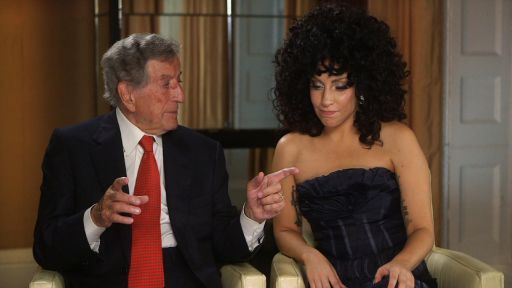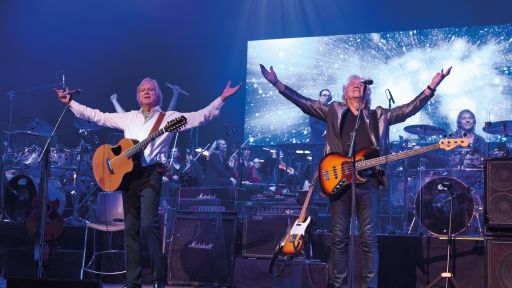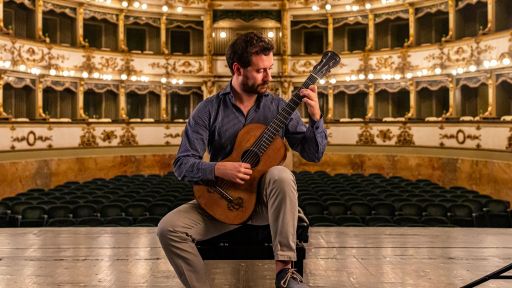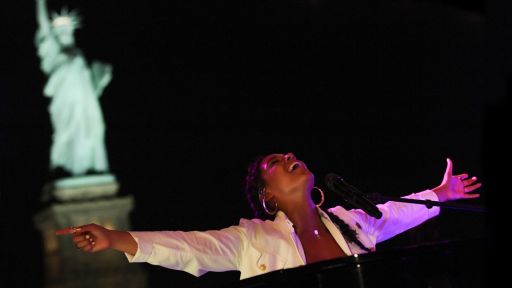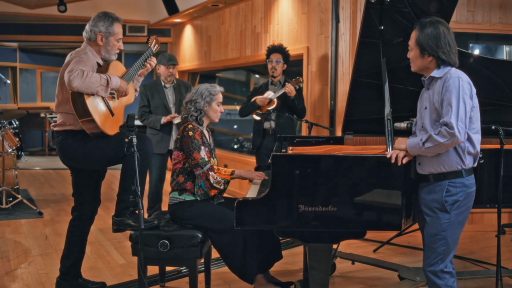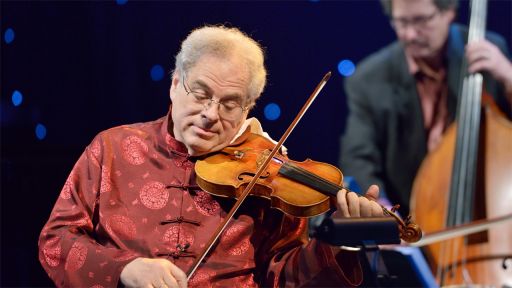Premieres Friday, April 26 at 9 p.m. on PBS (check local listings), pbs.org/gperf and the PBS app
Places visited: Boston, Dallas
Explore how virtuosos become maestros and discover their guiding principles through host Scott Yoo’s long friendships with Grammy winner Yo-Yo Ma, pianist Richard Kogan and violinist Lynn Chang.
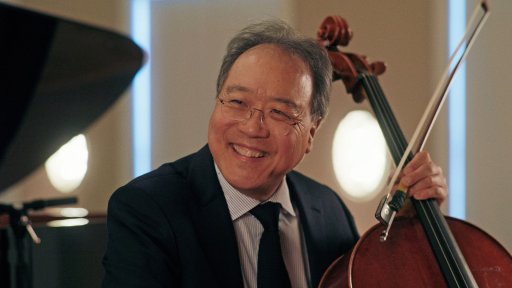
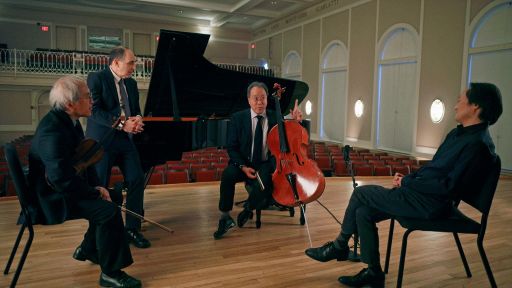
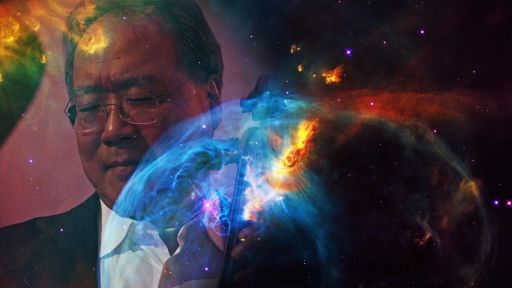
-I'm Scott Yoo.
In the last "Now Hear This" episodes, we looked at rising stars, then virtuosos, now, maestros.
♪♪ Yo-Yo Ma met his trio partners, Richard and Lynn, at college.
-Richard was a freshman, Yo-Yo was a sophomore, and I was a junior.
-As a freshman, Ricky won the concerto competition... [ Laughter ] ...which impressed Lynn's mother greatly.
-They play together and have remained friends ever since, even as different interests led them to very different careers in music.
This really kind of altered the direction of what happened in your life.
-I think you're right.
-Each one surprising.
-I think that we need to redefine what classical music is.
-Each one fascinating.
-I've had so many questions about George Gershwin's brain tumor.
-This could be a complete game changer for our entire field.
[ Applause ] The wisdom they've accrued over a lifetime of music and friendship could help anyone navigate the road.
-They taught me teamwork, respect, and allowing differences to exist together and thrive.
-Up next on "Great Performances," I'll laugh and learn with old friends.
♪♪ Major funding for "Great Performances" is provided by... ...and by contributions to your PBS station from viewers like you.
Thank you.
♪♪ -Fifty years ago, three Harvard students got together to play some Schubert.
♪♪ You may not recognize him under all that hair, but this one is Yo-Yo Ma.
At the time, this was one of the hottest new violin virtuosos, Lynn Chang.
♪♪ And this, someone you may remember from our Schumann episode, is Dr. Richard Kogan, who then was just Ricky.
Lynn, Ricky and Yo-Yo formed a trio and a friendship that has lasted ever since, and I wanted to know how they've done it.
♪♪ ♪♪ I wanted to learn more of the wisdom that they've learned from a lifetime of music and friendship.
♪♪ How many times have you played Schubert E flat together?
It's not dozens.
It's hundreds of times.
-I don't know.
Can you tell?
Can you remember?
-I don't know if we've reached deep triple digits, but we're high on the double digits, I think.
-You met Yo-Yo first, and then you introduced Richard to Yo-Yo.
Is that how it worked?
-Yeah.
The three of us were at the pre-college, truly, in high school, although we didn't know each other then.
We really got to know each other in college.
-We resonated immediately, quickly when we first started playing together.
We resonated for a few reasons.
We each knew how to play our instruments, and we were all incredibly unworldly.
We didn't know that much of anything.
Wouldn't you say compared to most of our classmates, we were amazingly unsophisticated?
-I knew nothing compared to the two of you.
[ Laughter ] -Did your lives go the way you expected each other's lives to go?
-Not at all.
-Really?
-Not at all.
-Tell me about that.
-Well, for the first 20 years of my life, I thought I would be a doctor like my father.
We always knew that Yo-Yo was going to be a cellist or a musician.
Maybe he didn't.
-It's funny.
I don't often talk about this, but I was immersed in a musical family, so there was certainly an expectation that I was going to go into music, and I guess I fell into it without ever making a conscious decision.
"This is what I want to do."
I think I spent the better part of my life, until I was 49, actually, thinking that maybe I should be doing something else.
That was always in the back of my mind until the moment I realized that my deep passion was to actually...
I remember as a five-year-old just wanting to understand things.
Life was so confusing.
People were so confusing.
Nature was so confusing.
Then I realized, all the things that I was interested in, I could actually look at and study through the lens of music.
Then I was fine.
After that, I was fine.
-I'd visit each of them to hear about their unexpected paths through life.
I'd start with Yo-Yo on the Harvard campus, where we both wanted to drop by Sanders Theatre.
-I love Sanders.
Well, a lot of our life was in there.
-Sure.
-Right?
-Yeah.
Pretty much every musician who's passed through Harvard has played here, including Yo-Yo, Lynn and Ricky, and later me.
I don't know if you remember this, but the very first time we spoke, it was not in person.
I was having an existential crisis as a 20-year-old, a junior.
I was talking to Lynn, and Lynn must have called you, and then you called me.
We spoke for about three hours, and I really haven't had a chance to properly thank you, but you told me things that really altered the course of my life.
-Really?
-Yes.
You set aside your entire morning to just talk to some random college student that you had known.
-Not random.
-You told me the most important thing about life is to know who you are, which I think is true many years later, and to allow things to appear.
Don't force things.
It was just very profound, and I'm grateful to you.
-That's really amazing.
-Yeah.
-You know, I heard you play at Sanders, and you were brilliant, brilliant violinist then and now, but you were hot.
You were so dazzling.
-I know you and Lynn and Richard separately, but when I speak with any of you guys, I feel like I'm dealing with the social skills Mensa.
You're just so considerate and incredibly present.
-I don't know, but I think you're talking about three different people.
[ Both laugh ] I think we were the biggest nerds on campus.
-I was just thinking there are so few trios of college friends that don't grow apart over decades.
But here you guys are, you're still... How has that affected your life?
-It's annoying to other people because it's the same jokes.
[ Both laugh ] It's like we laugh at the same things over and over again.
But Ricky, who struggled between wanting to go to med school or become a pianist.
Lynn, of course, comes from a medical family.
I think the arts and sciences component in each person is one of the things that brings us together, and we had so much fun together.
It just never changed through family, children.
-You're lucky.
-I am an unbelievably lucky person because I think I can also say to you how much they taught me on how to be a colleague, to mutually create good performances.
-You learned teamwork from your two friends.
-Yeah, teamwork, respect, and really allowing differences to exist together and thrive.
-Every time I've talked to Yo-Yo, I learn something.
This time, that differences make friendships stronger.
A powerful thought, especially for today.
Next, we headed to the Harvard Film Archive.
Yo-Yo has spent his career in classical music, playing all the unclassical music he could find.
When I asked him why, he wanted to show me a documentary.
[ Film reel clicking ] [ Man singing in foreign language ] ♪♪ -Wow.
That sound is so, for me, haunting and mesmerizing.
[ Vocalizing ] -Is he changing the pitch with his chin?
-Yes.
It's amazing.
He's a blind musician.
His value to the community is what he does through music.
It's some kind of spiritual acknowledgement, sometimes for animals, sometimes for hunting, this from "Bitter Melons."
-When did you first see this film?
Was it part of a class?
-I was part of an anthropology class where we were looking at, I think, three different cultures.
But it was that film and that person, that blind musician, that really struck me.
-Yeah.
So it's not a stretch to say that being exposed to this, this really kind of altered the direction of what happened in your life, exploring other cultures through their music.
-I think you're right.
It kind of ignited a lifelong search to go far away from the centers where there are, in some ways, more set traditions.
-So all of your many projects, like Silkroad, all of those projects had their origin here?
-Yeah.
I think it was the beginning of being comfortable with being uncomfortable.
When you stretch to beyond what is comfortable and familiar, and you actually deal with the unknown, you deal with the other, so that if I love something, and it's part of something I don't know, but I incorporate into my life, into my inner self, then that other is now part of me.
It affects every layer of how you think of things.
It's a memory that will never leave me, that actually I keep in my head and spurs me in what I do.
-Yo-Yo's interest in anthropology has persisted throughout his life, but his recent interest is astrophysics, so he's exploring that, too, through music and a new performing partnership with astrophysicist and pianist Amir Siraj.
I have a question for you, Amir.
How does your physics speak to your musicianship?
-For me, there's a huge give-and-take between the two.
Much of it is, I think, abstract and being open and questioning things.
There's this one time in particular, I was practicing a Bach Fugue, and I heard these two voices that seemed to be orbiting around each other.
I guess I wasn't doing a very good job of practicing because I had this in the back of my mind.
It led me to think about the possibility that the sun could have been born with a twin, with another sun, and they were collectively orbiting their center of mass.
In fact, I learned that 50% of sunlike stars are born this way.
It turns out that it's an interesting possibility, and it might solve some of the tensions we have in the outer solar system.
Because of that initial musical spark, I've stayed interested in the outer solar system.
Both music and science have this ability to expand our world, but also to shrink it at the same time.
-In physics, you have first principles, and I think in music, you also have first principles.
When you get to that essential part of things, you get to something that is simple, that can evolve into complexity.
-What are you going to play today?
-Well, it's a piece by an Estonian composer, which he wrote in 1978, and he was going through a difficult time trying to find a different way of composing.
He was looking for a simpler style.
For example, the piano part, you have bell-like sounds.
The cello part really both asks and sometimes answers questions.
The piece is called "Mirror and Mirrored."
If you think of putting an object between two mirrors, where do you get?
You get to infinity.
-Have you played it before?
-Well, this is a piece that we played, actually, in Paris at UNESCO, which is right next door to the European Space Agency.
The European Space Agency made a lot of the equipment that is on the James Webb Telescope.
And so we played it, displaying images that the James Webb Telescope captured as a statement about the infinitude of the universe.
♪♪ ♪♪ ♪♪ ♪♪ ♪♪ ♪♪ ♪♪ -After Yo-Yo left Harvard, he went and met that Kalahari tribe, learned their songs, and showed them his, then used his cello to travel the world, and now beyond.
Yo-Yo may not have fully realized it till he was 49, but it seems to me he spent his whole career exploring.
Now, that's something to learn from.
♪♪ Lynn's parents are both doctors, so did you think that Lynn was going to be a doctor, or did you think he was going to be a violinist?
-I think he went through the motions of going to medical school.
But really, you majored in cars more than anything else.
-[ Laughs ] Automotive technology, not cars.
-Sorry, automotive technologies.
You were known as the Professor.
-Yeah, I was Professor all over the place.
-Always telling people what to do.
Louis Kaplan, our chamber music teacher, called you the Professor.
I think the name stuck.
Don't you think, Ricky?
-Prescient, yes.
-Prescient.
[ Laughter ] -Similarly, I think it was my sophomore year, Lynn.
Lynn won the international Paganini Competition.
Paganini, that is the Mount Olympus of violin virtuosity.
Lynn was a real violin soloist virtuoso.
Like you, Scott, he was a young concert artist.
By the way, as a sign of our...
I don't know if it was more friendship or just pleasure in music making.
When Lynn did his debut recital in New York City, his concluding piece, he invited Yo-Yo and I to join him.
But Lynn has now evolved.
He's become the keeper of the flame, in a sense.
I think if I was able to step back a bit, I probably could've foreseen his evolution through soloist chamber musician to teacher.
♪♪ -Lynn has taught at every university in Boston, from Harvard and MIT to the music specialty schools.
At the Boston Conservatory at Berklee, he was rehearsing the school's Hemenway String Ensemble.
♪♪ ♪♪ ♪♪ Not coincidentally, this piece is by the Swiss-American composer Ernest Bloch, himself a celebrated teacher.
♪♪ -Okay, hold on, hold on.
-It sounds great.
-Thanks.
-Terrific.
-This piece has an unusual story as to its creation.
Can anybody tell me about it?
Neil?
-Yeah, I think Bloch wrote this in the early 20th century, during the time of a lot of other modernist composers like Stravinsky and Schoenberg.
He was a professor, so he wrote this for his students kind of after they challenged him.
They thought he couldn't write a piece that had both contemporary elements but also harked back to romantic classical and Baroque periods.
So he wrote this piece -- -It's a hard thing to do.
-It is really hard.
But he wrote this piece, "Concerto Grosso," which is in a Baroque form, and it has a lot of romantic melodies and rhythms.
Then he incorporated those 20th-century modern aspects into it, and then he took it to his students.
-Did they like it?
-They were totally blown away by it.
-So let's blow them away with this performance, okay?
-Hold on.
I'll join you.
-Okay.
♪♪ ♪♪ ♪♪ ♪♪ ♪♪ ♪♪ -You were a senior at Harvard.
You decided to enter the Paganini Competition.
-Right.
-Then you win the top prize.
-Right.
-So what happened then?
Did that change your life?
-It changed my parents' views of what I should be.
-Really?
-Yeah.
I only went to Harvard because my parents wanted me to be a doctor.
They wanted me to be pre-med.
-Were they hoping you were going to be a doctor until that moment?
-Yes.
Then, when I did so well, my mother said, "What are we doing?
You should just be a violinist."
-Really?
-Yeah, that was how it happened.
-Then you went back to biochem class after that?
-Well, I walked back into my Chem 20, which is the last class we take before applying for medical school, and I proudly dropped it.
-No kidding.
-Yeah, I dropped.
I said, "That's it.
I'm going to be violinist."
-Then you started playing a lot of concerts.
You form the Boston Chamber Music Society.
-Well, at Young Concert Artists, I met a number of my future colleagues.
We love playing with each other, so why don't we do something together?
And that's how almost by coincidence, I ended up at the Conservatory.
I also found myself being more popular as a teacher, and more students were coming to me.
and I really found that I love it.
It's great to see these kids carry forth the art form that I've had for so long.
-My very first exposure to you was listening to a violin recital you gave, which was the greatest violin playing I'd ever heard live.
Then a year later, you taught me a couple of Kreisler pieces.
What you taught me really transcended music.
It could have been about art or literature or anything having to do with a creative field.
Is that your teaching philosophy to somehow get people to metaphorically open their eyes?
-Absolutely.
-Is that what it's about?
-Yeah.
They're usually so occupied with putting their bows and fingers on the string, they don't think much more than the notes on the page.
And I'll say, "Well, this is about a lament" or "this is about dancing in the streets" or "this is about singing to a loved one," "this is a present for a wedding."
You have to play with that kind of love.
The best way to resonate with an audience is if you connect with them from heart-to-heart.
I think that that's the most important thing.
-Lynn asked me to meet him at another one of his schools, the New England Conservatory.
Here, he's teaching two violinists brothers, one of them already an award-winning composer.
♪♪ Josh Rosenthal just graduated.
15-year-old Ben, who's still a student, wrote this duet.
♪♪ ♪♪ Bravo.
-Bravo, bravo.
Very nice, guys.
Ben, this you write is in the form of a gig.
-Yes.
-It's a lively dance.
And for a dance, you need a pulse.
-Right, right.
-I think you've got sort of a swing to it.
But maybe you could do a little bit more.
[ Vocalizing ] I think when you give the first upbeat, it establishes the whole feeling of the piece.
Like if Scott, for example, he was going to conduct an upbeat, what would you do?
-You guys should give the upbeat.
-Yes.
You should pretend that you're a conductor, and you would... -Well, because communicating that just infuses the music with much more buoyancy and character.
You know, this situation of Lynn coaching you, it kind of reminds me of when I first met Lynn.
I was 10 years old, and I was playing... ♪♪ I was playing "Liebesleid," and Lynn said, "It needs to be thicker.
It needs to have more resistance.
Your sound needs to have more resistance like molasses."
And I didn't really know what molasses was, but by context, I figured out it was something thick.
A light bulb went off in my head that, "Ah," music can have a character.
I never thought of it.
I was 10 years old, and I still remember it, maybe not every day, but certainly every month.
-That's interesting because every day I teach, something of my upbringing comes back to me.
Some teacher has planted a seed in my system that comes to fruit, and I remember that they had said that to me many, many years ago.
The ritual of passing information on from one generation to another.
Maybe we can begin the gig again.
This time, let's really have a swing with a really nice upbeat that indicates the character of the music.
Okay?
♪♪ -From Lynn's teachers to him, then to me.
And I couldn't help wondering to how many more had he passed down information that shaped their lives.
♪♪ Have you ever counted how many students you've had?
-They're in the hundreds.
-With the orchestra, it's more.
-Oh, yeah.
Then it's thousands, yeah.
I stay in touch with a number of my students.
-How are they doing as a whole?
-A lot of them are married, they have kids.
They themselves are teaching.
It's really nice to see that when that happens.
-You were telling me about your former students who are inviting you to their festival.
What does that feel like when you've taught these people, and now they're all grown up, and they're running their own festival, and you're the guest artist?
-One of my students is from Lithuania.
She went back to her town of Vilnius and just started a music festival there.
The people there just love music.
Every time I go there, I feel this is why I got into music in the first place.
-It seems to me that you've spent your entire career, either as a performer or as a teacher, trying to get past the literal meaning or the superficial meaning.
-We're not cranking out iPhones.
That's not the way art works.
We're out to make people who have unique individual voices.
-You're trying to empower them to have their own point of view?
-Absolutely.
Playing well is just the beginning.
After that, you really have to have something to say.
I want them to develop an opinion as to what they think the music means so that they can go and be really expressive in their own unique way.
That's your duty as a performer anyway.
This is why we do it.
Oh, wow.
Lobsters.
-Incredible.
Is this your favorite dish here?
-In New England, this is the dish you eat, lobster roll.
-Okay, let's try it.
At Boston Conservatory again, Lynn was wrapping up rehearsals with the string ensemble.
♪♪ ♪♪ Bravo.
It's a really nice piece.
-Thank you.
That was "Silk and Bamboo" by Wu Man.
-She's the pipa player.
-Yes, but she was approached by her frequent collaborators, the Kronos Quartet, to write a piece for the quartet.
-You appropriated it for your orchestra?
-With her permission, she said, absolutely, please go ahead and do it.
-I like it with the bass and the richness of many people.
It just sounds terrific.
-It shows how music can transcend cultures.
-Is this part of a bigger project, like a multicultural project?
-Well, the title of this program is called "Music from Around the World."
We have music from Asia, North America, South America, Africa, and Europe.
-Why did you program something like this?
-Well, I did a lot of thinking during the pandemic.
I think that we need to redefine what classical music is.
We still love our European and Russian and American composers, but there's music elsewhere in the world that deserves to be heard.
I've chosen these composers to represent their various cultures.
-Nice.
You have, obviously, this is an Asian-inspired piece.
Do you have something, say, from South America?
-Yes, we do.
We have a piece by Gabriela Lena Frank, and the piece is called "Coqueteos."
And Andres can tell us what coqueteos means.
-Of course.
Coqueteo, it literally means "flirting."
The piece, it's about celebration, it's about having fun and dancing in the night and parties.
There is one part where the cellos get to shine, and we are the romanceros, which Frank describes as gentlemen who flirt with the ladies with singing and dancing.
-You're going to be singing and flirting with the cello?
-Yes, and why not dancing?
-Very nice.
Okay.
Well, let's hear some flirting.
♪♪ ♪♪ ♪♪ Lynn's passion for violin led him away from medicine, but his passion for professing led let him to his true calling.
And all of his students, myself included, are the lucky beneficiaries.
♪♪ -Okay, great.
-I was happy to see that, at 70 years old, he's still introducing them to new ideas in music.
Did you two know that Richard was going to be a doctor?
When you first met Doctor, what did you think?
-Well, he wasn't a doctor yet.
He was just Ricky.
-He was just a...freshman.
[ Laughter ] As a freshman, he already won the concerto competition, which impressed Lynn's mother greatly.
[ Laughter ] Sort of like, "So?"
-Yeah.
"So?
So?"
-She was great, Lynn's mom.
-Ricky was -- I think you were much more divided.
You were truly debating almost on a weekly basis.
"What should I do?"
You were making all the motions very seriously on getting to medical school, but the pull of the piano was unbelievably strong.
Plus, you were so incredibly gifted on the piano that there was -- I think there was an uncle tag.
Am I wrong?
-No, I think that's accurate.
I think the mind, complexity, the human mind always fascinated me, and I thought psychiatry would be really an interesting thing to pursue.
My feeling was I'm not going to do that instead of being a musician.
I'm just going to do that in addition to being a musician.
♪♪ -The Dallas Symphony Orchestra had asked Richard to give a presentation on George Gershwin.
I met him in their control room where they were filming a concert of the Brahms "Second Piano Concerto."
-Ready and... -Big time.
-Four to 31.
-This concerto was my first love.
Even before the violin concerto or the double concerto.
This was the one where I thought, "Ah.
This is the best."
-Ready?
And... -Six to 29.
-One of the greatest concertos ever.
-One of the hardest, right?
-Also a real handful for pianists but very gratifying.
-Yeah.
It's nice.
-Take one, and take nine, one to eleven.
-Ready and... -Take two.
Three.
We have four.
-Ready and... -Actually, we're thinking about doing a Brahms episode featuring this very concerto.
-I'm thinking about doing a program on Brahms all the time.
-Ready, and, ready, and.
-Three to eleven.
Eight to twenty-six.
-What was interesting issues, psychological issues for Brahms, was that he was enormously intimidated by the gigantic shadow of Beethoven.
It took him 20 years to write a symphony because he was so awestruck by Beethoven's nine symphonies.
Similarly, with the concertos, he said, "How could I do something like that?"
-He did pretty good.
-I think he did.
-Ready, and... -Take five.
-One to 28.
♪♪ -Let's continue this outside.
♪♪ You've become famous for doing these programs where you talk about a composer, their life, their mental state, and then play their music.
Where did you get that from?
How did this start?
-For many years, I had -- and it's a parallel career as a pianist and as a psychiatrist, which was pretty unwieldy.
Midpoint of my career, I had a conversation actually with my old friends, Yo-Yo and Lynn.
At a certain point, I remember Yo-Yo said, "Ricky, think more about the interface between these two fields."
And three of us got into this freewheeling discussion about the edge effect.
The edge effect is the notion that with two different ecosystems, the greatest biodiversities are right at the edge of the barrier between the two.
In those edges, that's where new life forms or new ideas are most likely to emerge.
I actually started thinking, "What can I do with the interface of these two fields?"
I'd spent a lot of years already as a practicing psychiatrist, which is really a privilege.
You get to actually hear the most intimate details about patients' lives.
They take you into their confidence.
I think it's given me some kind of a window or an insight into the creative process, and it's allowed me at least to explore the mystery of creative genius.
What was it that compelled these great composers to write their masterpieces?
This is what I'm most interested in, and I think so is everybody else.
-How does the psychiatry inform the piano playing?
Has it changed you as a musician?
Or vice versa?
-I think so.
I think actually in both directions.
Being a musician has really helped me as a psychiatrist.
Being a musician kind of grounds me in issues like communication, expression.
These sorts of things are not taught in psychiatric training.
They're extremely important.
Music does a lot of what psychiatrists and physicians want to do.
Music lifts spirits, it soothes anxiety, it reduces pain.
We intuitively know that.
In ancient cultures, the roles of physician and musician were played by the same person.
You'd have the shaman, the all-purpose healer.
He would use medical instruments, musical instruments.
The shaman just wanted us to heal.
These two fields split apart.
Medicine has become, I think, increasingly technologically driven, pharmacologically driven.
In a sense, returning some humanism to the world of medicine I think is really, really important now.
How can we bring these domains together, and what can happen as a result?
What better things?
How can we make the whole greater than the sun of the parts?
♪♪ -Richard's always looking for new ways to merge music and medicine.
So Dallas Symphony CEO Kim Noltemy invited us to see the work Dr. Yune Lee is doing with their youth orchestra.
-We're interested in children's brain and cognitive development after they receive rigorous and long-term music training.
-The principals of the schools tell us that their grades are better, that their absenteeism is down.
So we need to get all the information we can about what we're doing here.
-I'm very interested in how to scientifically, neuroscientifically characterize this effect on their brain development.
-To measure this, Dr. Lee and his assistants are giving a battery of tests to orchestra students.
♪♪ -Music is actually a really great cognitive exercise, and you have to do this.
It's called the sensory motor synchronization, meaning that you have to move your fingers in synchrony with sound.
It's a really computationally challenging process.
-Presumably, if April continues practicing the cello, keeps playing in this orchestra, a few months from now, she will be able to do that test even faster than she did now.
-That's exactly what we're interested in -- transfer from music to other cognitive domains such as language and memory, attention, executive function.
Would you like to see another one?
We have a EEG device.
-Yeah, sure.
-Sure.
-That would be great.
-Alright, I'm going to squirt some gel in the cap now.
This will feel a little cold on your head at first.
This gel is a conductive salt-based gel, and it's going to bridge this gap between the scalp and these little electrode sensors so that we can pick up the electrical activity of her brain.
Now I'm going to put these earphones in your ears.
You're going to hear some beeps of two different tones, and then there'll also be some pairs of words like bread, butter.
So if you hear something like that, then you should think inside your head, "match."
If you hear something that just doesn't go together, think "mismatch."
-Okay.
-Alright.
Are you ready?
-Okay.
[ Beeping ] -Beak, feather.
-We're collecting their brain data, brain activity, a neuron oscillation.
When they're actually paying attention to those tones, there is a specific marker in the brain that is a signature for attention.
We're tracking down that neural marker.
And we're going to collect this multiple times, and then we're going to compare the change of this brain activity in between music training.
-I've been studying, and I'm doing a program here on the mind and music of George Gershwin, an American composer.
Gershwin had enormous behavioral problems as a youngster.
He could not sit still in a classroom.
He was terribly hyperactive.
He persuaded his parents to let him take piano lessons.
And he was totally transformed.
Any thoughts?
Because in the ADHD kids, so many prescriptions are written for psychostimulant medication.
-Yeah.
-Do you think music possibly has a role in terms of helping these kids?
-Oh, yeah.
I formally believe that this is a non-pharmacological method to help them overcome their attention deficit or enhance their attention.
-Yes.
-You have completed your neurocatch brain scan.
-Alright.
How was that?
-Interesting.
-Siri, what has music done for you?
-It's more about discipline in a way when we're with the full orchestra because you're learning how to pay more attention to each other, but also to the conductor, and so I found myself being able to listen more to things around me and then also focus on what I'm listening to.
♪♪ -We believe with every ounce of our being that music is changing the kids' lives in every way, the social behavior, math skills, language skills, all of it.
-You know, Kim, if this study concludes what we think it might conclude, that music is extremely beneficial for children, this could be a complete game changer for our entire field.
-If we can have data to prove this, then this changes the whole approach to music education in this country and makes it a top priority, and that's what we're aiming for.
♪♪ ♪♪ [ Cheers and applause ] -Next, it was off to the UT Southwestern Medical Center, where Richard wanted to meet renowned neuro-oncologist Dr. Elizabeth Maher.
-I've had so many questions about George Gershwin's brain tumor, how it affected his music making, why so many physicians missed the diagnosis, because you know so much that I don't know.
-Well, it's a thrill to have you here, and let's talk about it.
What we're looking at here is a modern brain MRI.
Anything white shouldn't be there, and so the tumor, in this case, is focused in the right temporal lobe, the same location where Gershwin's ultimate tumor was identified.
-He had a host of symptoms.
He had a blackout on stage in which he experienced smelling burning rubber.
He had a couple of episodes of what seemed like psychomotor seizures.
He started feeling depressed, anxious, lost a lot of his confidence, but the general consensus was that these changes in mood could be explained by his disappointment with his career.
-The common presentation of these temporal-lobe tumors are these odd, epileptic-type events.
-Mm-hmm.
Garbage, yeah, yeah.
-Burning smells, panic attacks, anxiety out of the blue.
But we also know that he was young.
-Yes, he was.
-There's a subgroup of patients who are young and who have what we call a low-grade glioma that in 100% of the cases, untreated, will become a glioblastoma.
And in fact, let me show you what that looks like as something different from this.
This is a patient, 25 years old, who came to attention because of a generalized seizure.
What's really striking is this person had this much abnormality and yet went completely undiagnosed.
-Undiagnosed, yeah.
Could that explain the mood changes that he reported, the anxiety, the depression?
-Almost certainly.
-Almost certainly?
-I think that this is a classic now history of these young patients who actually start out with a low-grade glioma.
-So you've just figured out by virtue of forensic neuro-oncology that probably Gershwin had a glioma for years.
So my question is, how did that affect his music?
-Here's what I found actually the single most interesting feature of his story.
Spring of 1934, he asks to be treated for depression and anxiety.
Goes into treatment for a year and a half.
It's during that period of time that he wrote what I consider to be his greatest and certainly his most profound work, the opera "Porgy and Bess."
-Oh, my.
-I don't like over-romanticizing mental illness.
Most people who are depressed are not writing symphonies, but there are exceptions.
I think there's a depth of enormous empathy for the characters he was writing about in "Porgy and Bess," and very different, I think, from anything he had written earlier.
-So you can learn a lot from that.
His neurocognitive capacity was normal.
His musical ability somehow even heightened.
These are so slow growing that the brain can remodel, and so new circuits are accessed.
The most powerful message for me is that everybody in their own individual lives could look to Gershwin and say, "I still can perform.
I still can do this work.
I have life left ahead," and that is going to be so powerful for our patients to take away from a story that was basically 100 years ago.
♪♪ ♪♪ ♪♪ -On the Dallas Symphony stage, it was time for Richard's program.
[ Applause ] -That was "Rhapsody in Blue" by George Gershwin, arguably the greatest composer America ever produced.
George Gershwin was a terrible behavioral problem as a youngster.
Inattentive, disruptive, couldn't sit still in the classroom, but I'm convinced that a modern-day psychiatrist examining the young George Gershwin would diagnose him with conduct disorder or ADHD.
That hyperactivity that he had as a youngster, it persisted for the rest of his life.
You can hear it in his music.
Any of you know this Gershwin song?
♪♪ ♪♪ Yes, I heard several of you say "Someone to Watch Over Me."
When Gershwin played that song, it sounded more like this.
♪♪ [ Laughter ] People asked him, "Why do you play everything that way?"
He said, "We live in an age of staccato, not legato.
Now, staccato is a musical term which refers to short, abrupt, clipped playing, as opposed to legato, which is smooth and connected.
I think Gershwin lived in a central nervous system of staccato and not of legato.
[ Laughter ] Speaking of central nervous systems, I'm also going to tell you tonight about the brain tumor that killed George Gershwin at the untimely age of 38.
Tonight, I'm going to reveal to you some mysteries about this illness that I learned yesterday during a visit to UT Southwestern Medical Center, so this audience tonight will be the first audience to hear about this.
So come with me, and we'll explore the music and the mind of George Gershwin.
♪♪ ♪♪ -Like Yo-Yo and Lynn, Richard has followed his passions to an unexpected outcome.
The connections he's making between music and the mind inspire listeners and patients alike.
♪♪ -Yo-Yo's sense of humor really evolved through our repartee.
-Did you ever think that nearly 50 years later, you're still friends, your children are friends, your grandchildren are friends, and you're still playing music together, I mean, nearly a half-century, did you ever imagine?
-I had no -- -No idea, right?
-I discovered playing music with others through our collaboration, friendship with you guys.
Basically, what I realized is that, this, what we're doing together, is putting together two of my favorite things in life, which were music and friendship.
-Through music, we became friends.
We stayed in touch with each other all these years, and I think we always have a great time when we're all with each other.
-You're so lucky that you had each other, and it seems like the music bound you together.
-That's for sure.
-One of the first pieces of chamber music the three of us learned together was Brahms' "Trio Opus 8."
Brahms composed it when he was 20 years old, so we were around the same age that Brahms was when he wrote it.
It's a staple of the chamber-music repertoire.
This piece is heard a lot, but it's almost always heard in a version that Brahms produced 35 years later.
It's actually one-third shorter than the original, so he revisited it many, many years later.
-What's funny is that that piece actually is a lot about reflection.
-Yes, it is.
-We will be looking at it from a new perspective, not as 20-year-olds, but people who have reached their final trimester.
[ Laughter ] -Let's hear it.
-Okay.
♪♪ ♪♪ ♪♪ ♪♪ -What Yo-Yo told me all those years ago has certainly held for these three friends.
They've stayed true to themselves, which allowed their paths to appear, leading to very different careers.
They've let those differences bring them together in a lifetime of friendship, and that may be the best lesson anyone can learn from music.
I'm Scott Yoo, and I hope you can now hear this.
♪♪ ♪♪ ♪♪ -To order "Now Hear This" on DVD, visit ShopPBS or call 1-800-PLAY-PBS.
This program is also available on Amazon Prime Video.
♪♪ To find out more, visit pbs.org/greatperformances, find us on Facebook, and follow us on X.
♪♪ ♪♪ ♪♪
